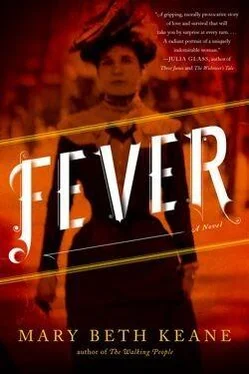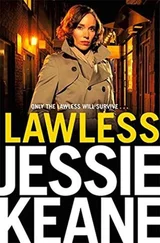She searched for a month. Six weeks. Two months. The weather grew warmer, the rooms at Mrs. Post’s closer. The nightly foot to the face or the belly was growing familiar, and that worried Mary more. She refused to grow accustomed to living that way. There had to be people who were honest and needed someone like Mary to help. June passed. July. Two of the women at Mrs. Post’s left, and with the breathing space those two empty cots offered, Mary decided to wait a few weeks, to spend her Sunday afternoons doing something else for a change, walking in the park, taking herself out for a sandwich. A few weeks turned into the entire summer. Then, at the end of September, as she was walking north along Third Avenue near Thirty-Sixth Street, she ran into Mrs. Borriello and one of her sons at the produce cart that traveled around the neighborhood.
“I remember you,” the son said before anyone had said hello. “Mama,” he turned. “She used to live in the building. Wasn’t she—”
Mrs. Borriello hushed the boy by touching him lightly on the shoulder. She spoke in Italian. “She says hello, how are you doing?” the boy said. “She said she is glad to see you.”
“I’m happy to see you,” Mrs. Borriello said in accented English.
Mary smiled at Mrs. Borriello, who had aged since Mary saw her last. “How are you?” she asked the boy. Carmine, she recalled. And the youngest one was Anthony. She calculated the oldest brother to be dead four years now. How well she remembered that afternoon, the hush that fell over the building when the news went up and down that the boy, sent by his mother to gather wood by the bulkhead on Twenty-Eighth Street, had been reaching for a piece of driftwood when he slipped into the river and was swept away. It came out later that Carmine, who’d gone along with his older brother, had run along the riverbank looking for help and came to a group of laborers having a break up on the pier. “Please!” he begged them. “My brother!” But all they did was look where the boy was pointing, and after a minute, as they all watched the boy drift farther away, and as they took their lunches from their pockets, one of the men offered the boy half a sandwich for strength before he went home to tell his mother. Mary wondered now if they ever fished the boy’s body from the river.
“How is Anthony?” Mary asked.
“He’s doing good.” The boy looked at Mary, and then down at his hands, and then back at Mary. She wanted to touch his face. “Hey, ah, did you hear about my father? That he died?”
“No,” Mary said. She put her hand on Mrs. Borriello’s arm. “I’m sorry to hear about your husband. How? He was a young man.”
Mrs. Borriello pulled her scarf tighter around her hair. “A freak thing,” the boy said. “He was down framing a new building on Broadway and Broome, and they said he had the harness on to do a little welding job up on the beam, and then a strong wind came and he lost his footing and the harness broke. And he fell. It was the fourth-story floor beam.”
How many times had the boy heard the story, Mary wondered, to be able to tell it so matter-of-factly? What could he understand about beams and framing and the building of buildings? He was probably about ten years old now, but he seemed to Mary both older and younger. Older with his swagger and his way of speaking for his mama, but younger when she examined his soft face, his long eyelashes, the way, underneath everything he said, he seemed to look at each of the women and ask, Did I say it right? Is that really what happened to my papa? Just a beam and a broken harness and a gust of wind? And before that my brother? Is it really possible that he was there beside me one moment and swept away the next? That there was nothing tying him more closely to his life? Or my papa to his?
“Your poor mother,” Mary said in a whisper as she examined Mrs. Borriello’s dark brown scarf that blended with her dark brown hair, her drawn face, her quick hands passing over one grapefruit and then another until she found one she liked.
Mary leaned slightly toward the boy, wanting to hug him. “When?”
“Almost a year.”
“One year in October,” Mrs. Borriello added, also looking at her son. All three were quiet as the shoppers rushed around them and the produce man kept glancing at them and at their pockets to make sure they hadn’t stuffed them without paying.
“Hey,” the boy said. “I remember the fireworks that time. Remember?”
“I do,” Mary said, taking him by the shoulders and pulling him toward her. I am lucky, she thought. When I think I am unlucky I must remember that I am lucky. I am blessed. The boy let himself be hugged, and then politely pulled away.
The woman said something in Italian, and the boy tried to signal his mother with his eyes that he didn’t want to translate. “She says you have also had sadness,” he said finally. “But your sadness is a blessing in disguise, maybe. Maybe not, but maybe. That man was not a good one, and Our Lord works in mysterious ways.” The boy added on his own, “He comes in sometimes. He seems different now.”
“You might be right,” Mary said, placing her hand on the woman’s arm again to say good-bye. She began to turn away, to wish them a good day and best of luck, when a thought came to her. “Carmine,” she said.
The boy waited.
“Does your mother have a boarder?”
“A boarder?”
“Someone who lives with you and pays a little of the rent.”
“No.” He looked at his mother, who was scrutinizing Mary. Mary got the feeling that she understood everything. She wanted to ask how they were making ends meet, but she knew that would be intruding too far. How to put it? She turned to Mrs. Borriello and spoke to her directly.
Mrs. Borriello waited, and Mary felt she was already preparing a phrase to turn Mary down. “I have a regular job, six and a half days a week, and I earn decent wages, though not as good as I did before. Before the island. You understand? When I was a cook. This job is in a laundry but the pay is regular. I could live with you, Mrs. Borriello, and help out with the rent and around the rooms. I am neat, and the boys already know me. I would—”
Mrs. Borriello let go a stream of Italian, and the boy protested in Italian for a few sentences, before turning and walking down the block a little, leaving the women alone.
“I’ve been thinking about something like this,” the woman said. “I don’t like the idea of a stranger. I don’t like to put it in a newspaper.”
“But I’m not a stranger. You saw me come and go for many years.”
“Yes.” She stared at Mary, and Mary recalled the portrait of the Sacred Heart she’d noted that time she stood in the Borriellos’ dim kitchen after the older boy’s death, Mrs. Borriello not yet able to get out of bed. This was a religious woman, and Mary was sure she’d disapproved of Alfred and their arrangement. What woman would approve? She’d been crazy, and foolish, but what woman would have given up on him, knowing what he was like at his best? He was worth it, she wanted to say to Mrs. Borriello. And she loved him. And Christian doctrine preached forgiveness as much as it preached anything else. Underneath that scarf and those widow’s weeds was a young woman, perhaps younger than Mary. You understand, Mary wanted to say to her. I know you understand.
“No guests,” Mrs. Borriello said. Mary’s face burned. It was no matter, Mary thought. A few weeks of living together and the other woman would see that Mary was not like that. It had just been Alfred she’d made an exception for. Only Alfred. And now Alfred was off and married and raising another man’s son.
“Never,” Mary agreed. She shook her head emphatically from side to side so the woman would understand. She felt a flush of sweat spring up on her neck. The boy was kicking a dried horse turd along the curb and glancing over at them. “My boys stay in their bedroom. You get the cot in my room or the kitchen.”
Читать дальше












